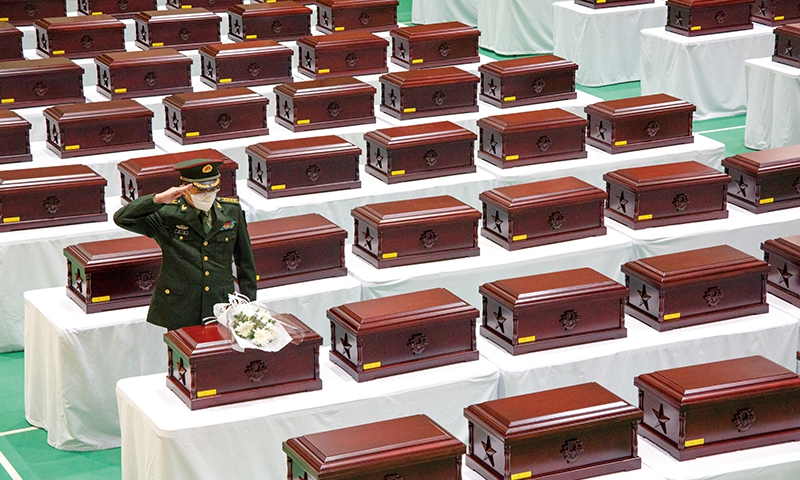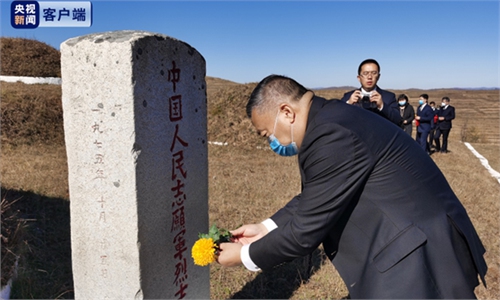
A Chinese military officer salutes during the coffin rites and the repatriation ceremony of Chinese soldiers’ remains from the Korean War (1950-53), in Incheon, South Korea on Wednesday. From 2014 to 2020, South Korea had returned the remains of 716 Chinese People’s Volunteers Army martyrs killed in the Korean War. This year’s repatriation ceremony, the eighth of its kind, is scheduled at the Incheon International Airport on Thursday. Photo: IC
China launches DNA data bases to help families identify their relatives among martyrs, who were killed in the 1950-53 Korean War, the Ministry of Veterans Affairs revealed on Monday, a day that commemorates the 71th anniversary of the Chinese People’s Volunteers entering the Democratic People’s Republic of Korea (DPRK) in the War to Resist US Aggression and Aid Korea.
From 2014 to 2021, South Korea returned the remains of 825 Chinese People’s Volunteers martyrs killed in the Korean War. In a scheme led by the remains search and identification center affiliated with the Ministry of Veterans Affairs, DNA data on all returned remains of Chinese soldiers were collected to help family members to identify their relatives.
The center will work to establish DNA data base of martyrs’ relatives and family members so as to match the data from the two data bases and increase the chance of martyrs to return to their own home. If the two data bases could not make a match, DNA data of martyrs will also send to DNA data base of the Ministry of Public Security for more possibility to get a match.
The Chinese People’s Volunteers fought alongside the DPRK army in the Korean War against the South Korean army and the US-led UN forces.
In 2015, Wang Shengqi and his team from the Academy of Military Medical Sciences started to establish the DNA base in South Korea for Chinese martyrs. Wang said the collection of DNA is of technical difficulties in nature due to the aging of the martyrs’ remains and their poor burying conditions. The degradation of the remains is very serious.
Wang noted most of the martyrs had no descendants when they sacrificed their lives and it’s rare to find their parents or siblings who are still alive, so the DNA work mainly relies on matching DNA with their distant relatives.
Wang said that his team has coped with technical bottleneck and they are able to complete the distraction of DNA within six hours at the shortest time. The distraction rate could surpass 95 percent.
Wang said that it is the first time in China they have launched mass DNA data base for connecting martyrs with their family members. Compared with other countries, China has been lagging behind especially in areas such as the lack of specialized agencies and full-time professions.
Li Zhongshui, the director of the remains search and identification center affiliated with the Ministry of Veterans Affairs, said the center will continue to work with South Korea to protect remains of martyrs and work on establishing a national standard protection system on searching the remains of martyrs.
“Helping martyrs seek relatives is a posture of the country and a commitment to soldiers. No matter where you are, the country has the responsibility to bring you home,” said Lü Chao, director of the Research Institute for Borderland at Liaoning Academy of Social Sciences.
The people’s respect for the heroes and martyrs should never change. Using modern technology to find the remains of the martyrs and find relatives for the heroic spirits of the martyrs who died 70 years ago is the people’s reverence for the martyrs and the respect and comfort to the relatives of the martyrs. It demonstrates the responsibility of a big country and political party, Lü said.
On the day that commemorates the 71th anniversary of the Chinese People’s Volunteers entering the DPRK in the War to Resist US Aggression and Aid Korea, Chinese netizens expressed their emotions on social media.
Sina Weibo has at least three trending topics relating to this topic, of which the hashtag “71th anniversary of the Chinese People’s Volunteers going abroad to Resist US Aggression and Aid Korea” has garnered more than 180 million views. Many paid respect to the Chinese soldiers who sacrificed their lives during the war.
On Monday, cinemas in many cites such as Beijing and Shanghai started to screen Remembering 1950, a Chinese documentary about the War to Resist US Aggression and Aid Korea. The movie was firstly screened in September.

A Chinese military officer salutes during the coffin rites and the repatriation ceremony of Chinese soldiers' remains from the Korean War (1950-53), in Incheon, South Korea on Wednesday. From 2014 to 2020, South Korea had returned the remains of 716 Chinese People's Volunteers Army martyrs killed in the Korean War. This year's repatriation ceremony, the eighth of its kind, is scheduled at the Incheon International Airport on Thursday. Photo: IC
China launches DNA data bases to help families identify their relatives among martyrs, who were killed in the 1950-53 Korean War, the Ministry of Veterans Affairs revealed on Monday, a day that commemorates the 71th anniversary of the Chinese People's Volunteers entering the Democratic People's Republic of Korea (DPRK) in the War to Resist US Aggression and Aid Korea.
From 2014 to 2021, South Korea returned the remains of 825 Chinese People's Volunteers martyrs killed in the Korean War. In a scheme led by the remains search and identification center affiliated with the Ministry of Veterans Affairs, DNA data on all returned remains of Chinese soldiers were collected to help family members to identify their relatives.
The center will work to establish DNA data base of martyrs' relatives and family members so as to match the data from the two data bases and increase the chance of martyrs to return to their own home. If the two data bases could not make a match, DNA data of martyrs will also send to DNA data base of the Ministry of Public Security for more possibility to get a match.
The Chinese People's Volunteers fought alongside the DPRK army in the Korean War against the South Korean army and the US-led UN forces.
In 2015, Wang Shengqi and his team from the Academy of Military Medical Sciences started to establish the DNA base in South Korea for Chinese martyrs. Wang said the collection of DNA is of technical difficulties in nature due to the aging of the martyrs' remains and their poor burying conditions. The degradation of the remains is very serious.
Wang noted most of the martyrs had no descendants when they sacrificed their lives and it's rare to find their parents or siblings who are still alive, so the DNA work mainly relies on matching DNA with their distant relatives.
Wang said that his team has coped with technical bottleneck and they are able to complete the distraction of DNA within six hours at the shortest time. The distraction rate could surpass 95 percent.
Wang said that it is the first time in China they have launched mass DNA data base for connecting martyrs with their family members. Compared with other countries, China has been lagging behind especially in areas such as the lack of specialized agencies and full-time professions.
Li Zhongshui, the director of the remains search and identification center affiliated with the Ministry of Veterans Affairs, said the center will continue to work with South Korea to protect remains of martyrs and work on establishing a national standard protection system on searching the remains of martyrs.
"Helping martyrs seek relatives is a posture of the country and a commitment to soldiers. No matter where you are, the country has the responsibility to bring you home," said Lü Chao, director of the Research Institute for Borderland at Liaoning Academy of Social Sciences.
The people's respect for the heroes and martyrs should never change. Using modern technology to find the remains of the martyrs and find relatives for the heroic spirits of the martyrs who died 70 years ago is the people's reverence for the martyrs and the respect and comfort to the relatives of the martyrs. It demonstrates the responsibility of a big country and political party, Lü said.
On the day that commemorates the 71th anniversary of the Chinese People's Volunteers entering the DPRK in the War to Resist US Aggression and Aid Korea, Chinese netizens expressed their emotions on social media.
Sina Weibo has at least three trending topics relating to this topic, of which the hashtag "71th anniversary of the Chinese People's Volunteers going abroad to Resist US Aggression and Aid Korea" has garnered more than 180 million views. Many paid respect to the Chinese soldiers who sacrificed their lives during the war.
On Monday, cinemas in many cites such as Beijing and Shanghai started to screen Remembering 1950, a Chinese documentary about the War to Resist US Aggression and Aid Korea. The movie was firstly screened in September.


